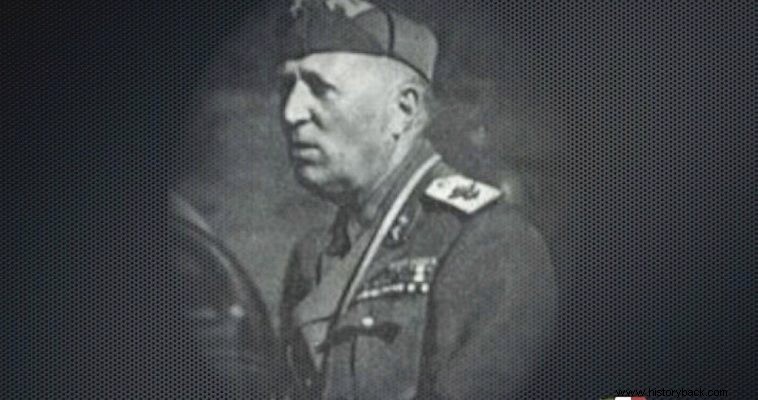
Sebastian Visconti Prasca was a peculiar case of man and general. Born in Rome, in 1883, into a noble family that traced its descent from the Dukes of Milan, he graduated from the military academy in 1904 with the rank of second lieutenant. He fought in the Italo-Turkish War of 1912, where he was decorated, He took part in World War I where he was decorated again. In 1917 he was promoted to lieutenant colonel.
After World War I he served briefly in Germany and in 1924 was posted as military attaché in Yugoslavia. He stayed there for 6 years, but was eventually expelled by the Yugoslavs on charges of espionage. On his return he assumed command of the 36th Infantry Regiment. He was then placed aide-de-camp to the chief of the Italian General Staff, Badoglio, who later removed him because Prasca discovered Badoglio's secret contacts with the French. Since then the relations between the two men have been bad.
However, he himself was considered anti-Axis, having declared, shortly after the outbreak of World War II, that he considered Germany's defeat inevitable! He was considered the Italian expert on blitzkrieg and had even written a relevant study, which piqued Mussolini's interest. Prasca helped draw up the plans for the Italian invasion of Ethiopia.
In 1935 he became brigadier general and aide-de-camp to the Italian king Vittorio Emanuele. In the same year, he took command of the "Coseria" Brigade, while in 1937 he was appointed commander of the 2nd Fast-moving (Celere) Cavalry Division "Emanuele Filiberto". He was then appointed military attaché in Paris, but after the occupation of Albania by Italy he returned and took command of the 3rd Army Corps, with the rank of lieutenant general. On May 26, 1939, he was placed in charge of the Italian forces in Albania. In Albania he immediately started organizing Albanian sections and gangs. In June 1940 he became a lieutenant general and was entrusted with the planning of the attack against Greece.
On October 15, 1940, he was in Rome participating in the perionymous council that decided the attack against Greece. At the meeting Mussolini set October 26 as the date of attack. He defined as the first objectives the occupation of Epirus and the Ionian Islands. In the second year, the whole of Greece would be occupied. The Italian governor of Albania, Giacomoni, then spoke, who spoke of the enthusiasm of the Albanians to take part in the attack against Greece. "In Albania, the attack on Greece is anxiously awaited and the excitement is so great that Albanians are submitting numerous applications to join the forming Albanian units of the Italian Army," he said.
Then Visconti Prasca took the floor. "The attack on Epirus is ready to take place on the 26th of October, as fixed by the Duce, under the most favorable omens. The ratio of the defending Greek forces in Epirus, compared to the Italian ones, is 1:2. This operation, calculated to the smallest detail, must be completed within 10 to 15 days and enable us to annihilate all the Greek forces. The morale of the Italian troops is excellent. Their excitement is indescribable, and the only symptoms of indiscipline observed are due to the extreme anxiety of all to throw themselves at once into the race. The operation has been prepared in such a way as to give within a few days the impression of an overwhelming storm," said the Italian general.
Although Prasca's plans were not approved by his old enemy Badolio, Mussolini approved them and so on October 28, 1940 the Italians invaded Greece. But they invaded with only the equivalent of four divisions. Essentially Praskas threw half of his available forces into battle, reducing the rest to a passive, defensive role, being overly confident that he could use blitzkrieg tactics against the Greeks in Epirus and Pindos.
The development is well known and the defeat of the arrogant and arrogant Italian general at Kalpaki sealed the course of the Greco-Italian War. After repeated failures, an enraged Mussolini gradually replaced Praska. However, the damage was done and was never repaired, for the Italians. Praska never returned to active duty after that.
After the Italian capitulation in 1943 he joined the resistance. He was captured by the Germans and sent to a camp in occupied Poland. He was liberated by the Soviets in April 1945 and witnessed the Battle of Berlin. He returned to Italy where he wrote his infamous book "I attacked Greece" , whose title alone shows the absolute egoism of the man and in which he tried to justify his terrible failure, quoting fantastic facts about superior Greek ammunition, about better and modern Greek guns, etc. He died in 1961.
Praska made the mistake of dramatically underestimating the capabilities of the Greek forces facing him, but also of ignoring the terrain and weather conditions. Also his disposition of five divisions on defensive missions and disposition of only four on the attack shows either his unimaginable selfishness, or his stupidity! If from the beginning he had reinforced the Alpinist division "Julia" with another division, it is certain that the Greek front on Pindos would have collapsed, with what this would entail for the front of Epirus. Also instead of persisting against the Greeks entrenched in the location of Elia-Kalamas, he should have taken advantage of the success of his forces in Thesprotia.
Any deep Italian advance there would threaten the flank of the Greek defensive location of Elia – Kalama. But Praska did none of these things. Instead he persisted against the Greek defensive location, relying on his overwhelming superiority in artillery, tanks and air force. When the artillery and air force failed to dismantle the Greek defense thanks to the foresight of the commander of the Greek VIII Infantry Division Major General Charalambos Katsimitros, the Italians, not having sufficient infantry forces, were pinned down, as well as their chariots, before the Greek defensive preparations, nothing they performed.
